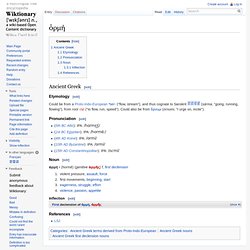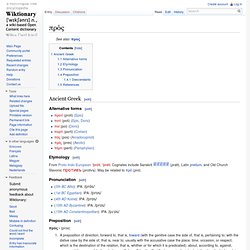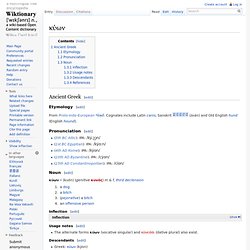

Πηγή. Ὁρμή. Ancient Greek[edit] Etymology[edit] Could be from a Proto-Indo-European *ser- (“flow, stream”), and thus cognate to Sanskrit सर्म (sárma, “going, running, flowing”), from root √sṛ (“to flow, run, speed”).

Could also be from ὄρνυμι (ornumi, “I urge on, incite”). Pronunciation[edit] (5th BC Attic): IPA: /hormɛ͜ɛ́/(1st BC Egyptian): IPA: /horméː/(4th AD Koine): IPA: /ormí/(10th AD Byzantine): IPA: /ormí/(15th AD Constantinopolitan): IPA: /oɾmí/ Ῥοία. Ancient Greek[edit] Etymology[edit] From ῥέω (rheō, “I flow”) Pronunciation[edit] (5th BC Attic): IPA: /r̥o͜ɪ́.a͜a/(1st BC Egyptian): IPA: /r̥ýːaː/(4th AD Koine): IPA: /rýa/(10th AD Byzantine): IPA: /rýa/(15th AD Constantinopolitan): IPA: /ɾía/

Χύνω. Ancient Greek[edit] Verb[edit] χύνω • (khunō) (of liquids) to pour out, let flow(of solids) to shed, scatter.

Πρός. Ancient Greek[edit] Alternative forms[edit] προτί (proti) (Epic)ποτί (poti) (Epic, Doric)ποί (poi) (Doric)πορτί (porti) (Cretan)πός (pos) (Arcadocypriot)πρές (pres) (Aeolic)πέρτι (perti) (Pamphylian)

Πνέω. Ancient Greek[edit] Alternative forms[edit] πνείω (pneiō) (Poetic) Etymology[edit] From Proto-Indo-European *pnew-. Cognates include Old English fnēosan (English sneeze). Ψύχω. Ancient Greek[edit] Etymology[edit] Uncertain. Could be from a Proto-Indo-European *bʰes-, with cognates including Sanskrit भस्त्रा (bhástrā, “bellows”) and Albanian badër. Beekes argues for a Pre-Greek origin. Pronunciation[edit] Ὑφέν. Ancient Greek[edit] Alternative forms[edit] ὑφ' ἕν (huph' hen) Etymology[edit] Contracted from ὑφ' ἕν (huph' hen), from ὑπό (hupo, “from”) + ἕν (hen, “one”), neuter of εἷς (heis, “one”) Ψυχή. Ancient Greek[edit] Etymology[edit] From ψύχω (psukhō, “I blow”).

Pronunciation[edit] (5th BC Attic): IPA: /pʰsy͜ykʰɛ͜ɛ́/(1st BC Egyptian): IPA: /pʰsyːkʰéː/(4th AD Koine): IPA: /ɸsyxí/(10th AD Byzantine): IPA: /psyxí/(15th AD Constantinopolitan): IPA: /psixí/ Noun[edit] Θέμα. Ancient Greek[edit] Etymology[edit] From the Ancient Greek root θε- (the-) and the suffix -μα (-ma).

Cognate to τίθημι (tithēmi, “I put, place”). Θεός. Ancient Greek[edit] Alternative forms[edit] Etymology[edit] Thematicization of Proto-Indo-European *dʰh₁s-, zero grade of s-stem noun derived from *dʰeh₁-. Cognate with Phyrigian δεως (deōs, “to the gods”), Old Armenian դիք (dikʿ, “pagan gods”) and Latin fēriae (“festival days”), fānum (“temple”) and fēstus (“festive”). Despite the superficial similarity, the word is not related to Latin deus. Κύων. Ancient Greek[edit] Etymology[edit] From Proto-Indo-European *ḱwṓ.

Cognates include Latin canis, Sanskrit श्वन् (śván) and Old English hund (English hound). Σῶμα. Ancient Greek[edit] Pronunciation[edit] (5th BC Attic): IPA: /sɔ́͜ɔma/(1st BC Egyptian): IPA: /sóːma/(4th AD Koine): IPA: /sóma/(10th AD Byzantine): IPA: /sóma/(15th AD Constantinopolitan): IPA: /sóma/ Noun[edit] σῶμα • (sōma) (genitive σώματος) n, third declension body (both that of people and animals)dead body (most common in Homer and other early works)One's life in the physical worldThat which is material (as opposed to spiritual)personAn entire thing(mathematics) three-dimensional object.